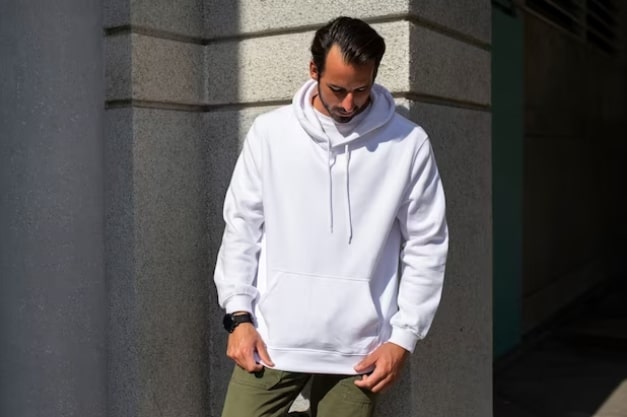We always buy clothes without thinking about how it gets to us, but when it comes to apparel, especially hoodies and T-shirts, we should consider the textile industry. Hoodie real and T-shirts contain various materials, including cotton, polyester, and fleece. Bringing together the complexity of production, inventory, material management, and shipping is the responsibility of an industry we rarely think about but rely on all the time – the textile industry.
What is the textile industry?
The textile industry produces textiles, materials made from natural or synthetic fibers. Textiles consist of various materials, including cotton, polyester, and fleece. The textile industry involves multiple parts of the production process, including spinning and dyeing yarn, designing and producing garments, quality control, supplying and marketing textiles, and shipping.
Spinning and Dyeing Yarn
While the end product is familiar, the first steps of the textile industry involve spinning and dyeing yarn. First, spinning yarn is drawn from a spindle and wound onto a bobbin. The yarn is then wound around a bobbin several times, and the process repeats until the yarn is too thick to be spun. Then, add dye to the yarn, and the spinning process repeats.
Parts of the Industry
The textile industry has several parts of the production process, including design, production, quality control, and shipping.
Design
Textile designers work to design garments that suit a variety of needs and styles. They may work with manufacturers to develop new designs or modify existing designs.
Production
Producers work to create garments that meet the specifications set by designers. They may work with a variety of manufacturers to produce the garments.
Quality Control
Quality control is an integral part of the textile industry. Garments must meet specific standards to sell in the market.
Shipping
Shipping is an essential part of the textile industry’s infrastructure. Textiles must be shipped to retailers so that they can sell the garments.
Wholesale Sales
Wholesale sales help the textile industry by providing large orders. Wholesale buyers purchase large quantities of textiles and resell them to retailers.
Marketing
Textile marketers work to promote the sale of textiles. They may develop marketing strategies or work with various marketing partners to promote the sale of materials.
Supply Chain Logistics
Supply chains move products around the world for the textile industry. Therefore, suppliers must work with numerous manufacturers and logistics providers to ensure the delivery of textiles to retailers in a timely and efficient manner.
Retail
Retailers sell textiles to consumers. In addition, they may work with suppliers to ensure that the textiles they sell are high quality.
Methods for Making Textiles
There are a variety of methods for making textiles. Some methods, such as hand sewing, are more labor-intensive than other methods, such as sewing machines.
Hand Sewing
Hand sewing is a more labor-intensive method of making textiles. It requires a lot of skill and patience to complete a garment using this method.
Sewing Machines
Sewing machines are a more efficient method of making textiles. They can complete more garments in a shorter time than hand sewing.
Large Manufacturing – Computerized Equipment
Large manufacturing – computerized equipment is an essential part of the textile industry. This type of equipment creates complex garments quickly and efficiently.
Dyeing and Stamping
Dyeing and stamping are more advanced methods of making textiles after they have been spun and sewn. It involves using heat and chemicals to create unique patterns on the garments.
Industries Relying on the Textile Industry
The textile industry is complex and widespread. Industries that rely on the textile industry include:
Household Linens
Our everyday linens, such as sheets, towels, and napkins, are often made from cotton. As a result, household linen is a significant export for the textile industry.
Clothing
Clothing is another major export for the textile industry. Clothing comprises various materials, including cotton, polyester, and fleece.
Imports and Exports
Imports and exports are a vital part of the textile industry. Textiles are exported to many countries worldwide, providing jobs for import and export companies.
Wholesale Clothing Suppliers Rely on the Textile Industry
Wholesale clothing suppliers rely on the textile industry to produce their clothing. Wholesale clothing suppliers often contract with manufacturers to make the clothing they sell, choosing manufacturers based on the best-value items while maintaining the highest standards of quality.
Selling clothing has never been easier, especially online, thanks to wholesale clothing suppliers relying on the textile industry to make it all happen.
Start Selling More Clothing Thanks to Bella + Canvas, A Leading Online Wholesale Clothing Supplier
Selling clothing can be a challenging but rewarding business. Partnering with a wholesale clothing supplier is the best way to make this happen. Bella + Canvas is one of the leading online wholesale clothing suppliers, and we are committed to helping you sell more clothing in a more efficient and organized way.
There are many benefits to working with a wholesale clothing supplier, including the following:
Low Costs
Wholesale clothing suppliers have lower costs than retail clothing stores, helping you sell more clothing at a lower price.
Efficient Distribution
Wholesale clothing suppliers can distribute clothing more efficiently than retail clothing stores. Therefore, it helps you sell more clothing in a shorter amount of time.
Quality Control
Wholesale clothing suppliers can maintain high-quality standards while selling clothing at a lower price. As a result, it ensures that you receive the most reliable and consistent clothing possible.
We work with numerous manufacturers to source the best clothing at the best prices. In addition, we maintain the highest standards of quality, ensuring that your customers are always happy.
Thank you for considering Bella + Canvas as your go-to wholesale clothing supplier. We look forward to helping you sell more clothing in a more efficient and organized way. So create your account today, and place your first order.



















































